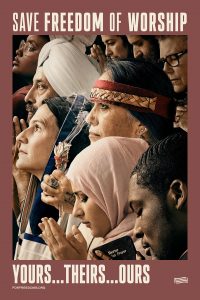One Nation Under God – But Whose God?
The government and people of the United States of America have always had a contentious relationship with religious tolerance starting with the 13 colonies that founded our republic.
In Virginia, for example, the colonial government, following the tradition of their forefathers in England, established a state-funded religion in the Anglican Church. In the late 1700s, Baptist preachers from other colonies seeking converts in Virginia were jailed for “preaching without a license.” Though disagreeing with their theology, Thomas Jefferson joined forces with the Baptists to challenge and change Virginia’s laws.
Here’s what Jefferson’s bill said: “No man shall be compelled to frequent or support any religious worship, place or ministry whatsoever…All men shall be free to profess and by argument to maintain their opinions in matters of religion.”
Push back came from none other than Patrick Henry. Henry worried that without state support, religion in Virginia would wither and die. To counter Jefferson, Henry drafted a bill that would fund not just the Anglican church but other approved denominations.
Despite objections, Jefferson’s “religious freedom” bill passed in Virginia in 1783. Soon its principles were enshrined in the first Amendment of the US Constitution Bill of Rights: Congress shall make no law respecting an establishment of religion or prohibiting the free exercise thereof.
What is today’s Christian Nationalist movement about?
In the third decade of the 21st century, there is an emerging force directly challenging the 1st Amendment and the separation of church and state. It’s called Christian Nationalism.
The publication Christianity Today defines Christian Nationalism as a belief system that our American nation should be defined by Christianity, and that the government should take active steps to keep it that way. Popularly, Christian nationalists assert that America is and must remain a “Christian nation”—not merely as a part of American history, but as a prescriptive program to shape how we define ourselves as Americans in the future.
Why is Christian Nationalism a threat to our democracy?
While the magazine asserts that Christian nationalists don’t reject the 1st Amendment and are not advocates for establishing a theocracy, it recognizes that they do believe Christianity should enjoy a privileged position in the public square. Others who have studied the Christian Nationalists, such as journalist Katherine Stewart would argue they represent a direct threat to our democracy.
Stewart is particularly concerned at how, with the election of Donald Trump as president in 2016, what used to be considered a fringe element in our public square is now playing a pivotal role in the Republican party’s agenda of demonizing the Other, especially immigrants and so-called Leftists or Socialists. Christian Nationalists see today’s political polarization from the perspective of a religious war, and they are the patriots out to save our country from the forces of Satan. Here’s a short interview with Stewart that helps explain how the Christian Nationalist movement is exerting influence on all our lives.
This Christian Nationalist political agenda to influence state and local government has been, as Stewart notes, years in the making and well funded by private groups made up of wealthy individuals. And it’s important to note that its appeal may start with a call to arms to defend Christian values, (positioning Democrats as a Godless threat to our culture and children’s well-being), they also promote a positive vision for the future for those chosen ones—especially conservatives in minority groups.
At one conference, Stewart described how, “Speaker after speaker told hopeful stories of personal triumph and presented a vision of an America characterized by what they call “freedom,” opportunity, personal empowerment, and spiritual fulfillment. Party loyalists in Kissimmee passionately conveyed the message that this happy future is within their grasp—they just need to trample a few “demonic organizations” to get there.”

